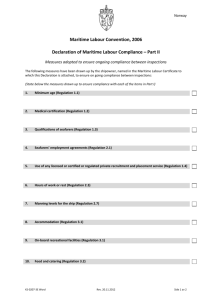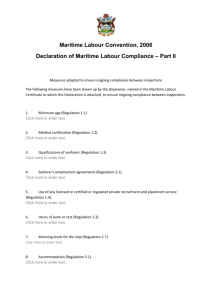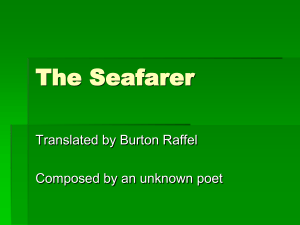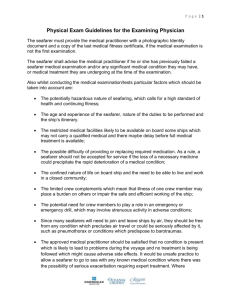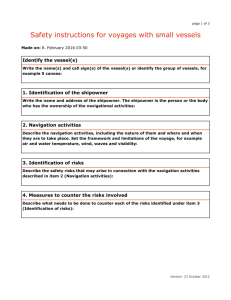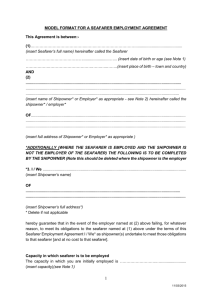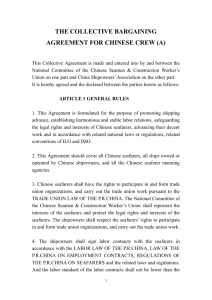Joint Committee for the Merchant Marine Collective Labour
advertisement
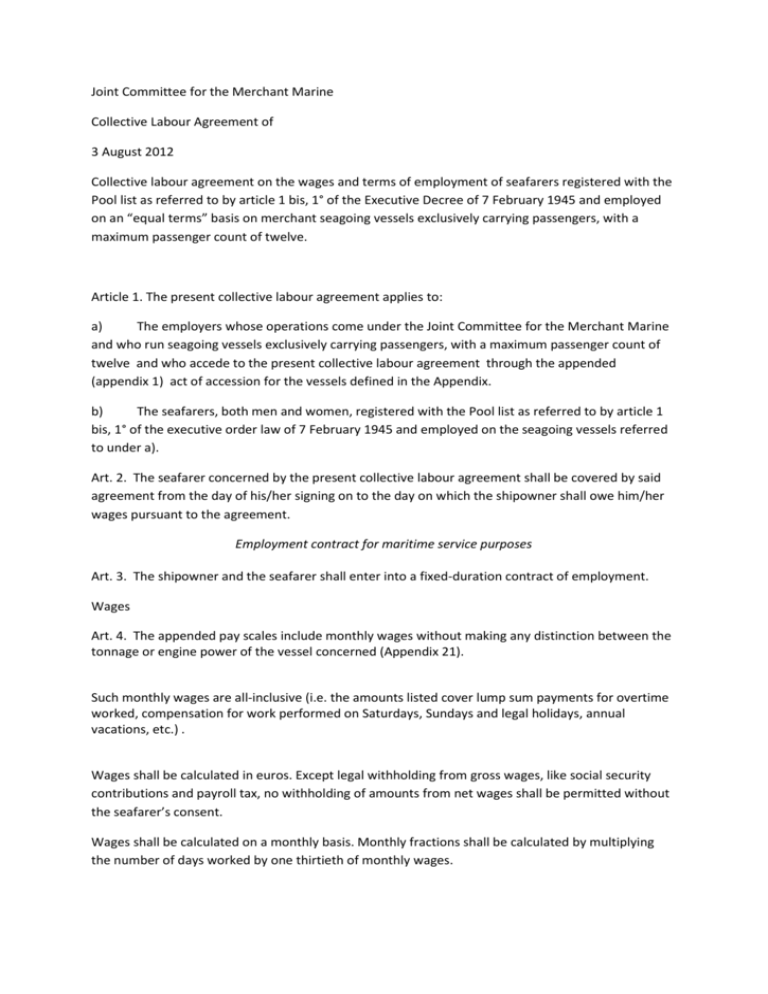
Joint Committee for the Merchant Marine Collective Labour Agreement of 3 August 2012 Collective labour agreement on the wages and terms of employment of seafarers registered with the Pool list as referred to by article 1 bis, 1° of the Executive Decree of 7 February 1945 and employed on an “equal terms” basis on merchant seagoing vessels exclusively carrying passengers, with a maximum passenger count of twelve. Article 1. The present collective labour agreement applies to: a) The employers whose operations come under the Joint Committee for the Merchant Marine and who run seagoing vessels exclusively carrying passengers, with a maximum passenger count of twelve and who accede to the present collective labour agreement through the appended (appendix 1) act of accession for the vessels defined in the Appendix. b) The seafarers, both men and women, registered with the Pool list as referred to by article 1 bis, 1° of the executive order law of 7 February 1945 and employed on the seagoing vessels referred to under a). Art. 2. The seafarer concerned by the present collective labour agreement shall be covered by said agreement from the day of his/her signing on to the day on which the shipowner shall owe him/her wages pursuant to the agreement. Employment contract for maritime service purposes Art. 3. The shipowner and the seafarer shall enter into a fixed-duration contract of employment. Wages Art. 4. The appended pay scales include monthly wages without making any distinction between the tonnage or engine power of the vessel concerned (Appendix 21). Such monthly wages are all-inclusive (i.e. the amounts listed cover lump sum payments for overtime worked, compensation for work performed on Saturdays, Sundays and legal holidays, annual vacations, etc.) . Wages shall be calculated in euros. Except legal withholding from gross wages, like social security contributions and payroll tax, no withholding of amounts from net wages shall be permitted without the seafarer’s consent. Wages shall be calculated on a monthly basis. Monthly fractions shall be calculated by multiplying the number of days worked by one thirtieth of monthly wages. Monthly wages shall be index-linked in accordance with the collective labour agreement of 5 May 1997 introducing an index formula (registered under number 45084/CO/316 and declared generally binding pursuant to the Royal Decree of 22 January 2002 as published in Belgium’s Official Journal of 19 June 2002). Hours of Work Art. 5. The average working time shall amount to 38 hours a week. The actual hours of work shall amount to 40 hours a week and 8 hours a day. If extra work is required the following treaty shall apply: ILO (International Labour Organisation) treaty number 180 (Act of 13 May 2003 on assent to the following international instruments: Treaty 180 on Seafarers' Hours of Work and the Manning of Ships approved in Geneva on 22 October 1996, as published in Belgium’s Official Journal of 13 November 2003), ratified by Belgium on 10 June 2003 is applicable as well as the collective labour agreement of 15 October 2003 on minimum resting time for seafarers and shoregoers (registered under number 68565/CAO/316 – declared generally binding by the Royal Decree of 7 May 2004, published in Belgium’s Official Journal of 7 July 2004) It is provided therein that the minimum resting time shall not be less than: 10 hours in a 24-hour period and 77 hours in a 7-day period. The Master shall reserve the right to impose work at all times: with respect to the safety of the vessel, the passengers and crew; regarding assistance to other vessels or persons in distress; concerning fire, lifeboat and all similar drills prescribed by international conventions; with respect to formalities for Customs, quarantine and medical proceedings; regarding the determination of the ship’s position and other meteorological observations; with respect to relieving watchkeepers; concerning environmental protection and exercises related thereto. Such tasks shall not give rise to the payment of wage supplements. Vacations Art. 6. For each 30-day voyage the seafarer shall be entitled to 30 days off. The days off shall be taken up after signing off. Thereby the shipowner shall meet all his obligations under the law with respect to vacations, official holidays, hours of work and annual vacations. Termination of the employment contract for maritime service purposes Art. 7. Without prejudice to article 73, Chapter VIII of Title VII of the Act of 3 June 2007 on miscellaneous labour provisions a seafarer may terminate the employment contract : a) in joint consultation with the shipowner/Master, subject to having advised the shipowner/Master thereof at least two (2) weeks in advance, either in writing or verbally in the presence of a witness; b) if the vessel is going to a war zone; c) if the vessel has been declared unseaworthy and if the shipowner has been unable to solve the problem within a reasonable timeframe; the shipowner may terminate the employment contract early in the following cases: d) if the seafarer engages in inappropriate behaviour, including violations of the drugs and alcohol policy. Prior to discharging the seafarer for inappropriate behaviour the shipowner shall advise said seafarer in writing of the motive for his dismissal. Without such written notice the dismissal shall be invalid and the seafarer shall be entitled to compensation equal to the amounts due for the remaining duration of the employment contract. War zone Art. 8. When war breaks out somewhere in the world the social partners of the joint committee for the Merchant Marine shall determine in joint consultation and based on international standards the area to be declared a war zone. The relevant modalities with respect to wage and terms of employment shall be agreed jointly and immediately. Repatriation Art. 9. In case of repatriation the seafarers shall be entitled to free transport, at the shipowner’s expense, to their port of recruitment, subject to following the route and repatriation mode specified by the shipowner or his representative. This covers the transport of the seafarer’s personal luggage up to a maximum of 40 kg. If the contract is terminated early at the seafarer’s request (7a) and in case of disembarkation on the grounds of inappropriate behaviour (article 7d) the seafarer shall personally bear the travel costs involved. The seafarer shall be entitled to his wages until his arrival on the location of his recruitment, subject to having made the voyage back along the route and within the timeframe specified by the shipowner or his representative. However, in case of disembarkation on the grounds of inappropriate behaviour the seafarer concerned shall forfeit his right to wages for the travel days. Employer’s obligations Art. 10. Over and above the working clothes to be supplied to the seafarer, the shipowner shall additionally make available efficient protective clothing as required by the work to be performed. Art. 11. Under no circumstances shall crew members bring food on shore without the shipowner’s permission. The inspection of the provisions and the control of food consumption shall be handled by the consultation committee as provided for by the collective labour agreement of 14 December 2005. Uniform Art. 12. The shipowner reserves the right to make the wearing of a uniform compulsory for some well-defined positions. Seafarers employed in such positions thereby commit themselves to wearing and maintaining the uniform. Any refusal to wear the prescribed uniform may lead to failure to meet the requirements set by the employment contract and therefore to the termination of said contract. Seafarer’s obligations Art. 13. Unless express authorization is obtained from the shipowner/Master, seafarers shall be prohibited from loading any merchandise onto the vessel for their own account. Seafarers violating this ban shall be liable to all damage, fines or sanctions incurred by the vessel as a result of such action, without prejudice to the Master’s right to have the merchandise concerned destroyed. Seafarers are prohibited from bringing alcoholic beverages on board without the shipowner’s/Masters permission. This applies as well to goods or objects for the seafarer’s personal use subject to restrictive provisions from the authorities of the country of the port of call. The seafarer shall declare at all times to the Master the precise quantity of items for personal use in his/her possession. He/she shall be liable for the consequences resulting from false statements with respect to such items. The seafarer acknowledges and shall submit to the policy on drugs and alcohol as introduced by the shipowner. Any infringement thereof may result in the immediate termination of the employment contract. The seafarer is responsible for the objects made available to him/her by the shipowner for carrying out his occupation. If such objects are deliberately destroyed or damaged the seafarer shall owe the shipowner compensation. Seafarers are obliged to have in their possession the legally compulsory, original and valid documents and to hand them over to the Master for the duration of the voyage as stipulated by the contract. Such documents include, among others, the STCW certificates, the seaman’s books, the certificate of medical fitness, the vaccination certificate, the travel documents like international passports and any Flag and shipowner documents. The seafarer makes a commitment to exhibit the discretion required with respect to matters concerning the shipowner or the passengers, both during the voyage and after signing off. Art. 14. The present collective labour agreement, concluded for an indefinite duration, shall become effective on 1 August 2012. Each signatory may terminate the agreement subject to a six-month term of notice. Said notice shall be sent by registered (postal) mail to the chairman of the joint committee for the merchant marine and notified to each signatory. The six-month term starts to run from the date on which the registered mail shall have been sent to the chairman. Appendix 1 Federal Government Agency for Employment, Labour and Social Consultation Genera l Directorate for Collective Labour Relations Department for Sector Consultations JOINT COMMITTEE FOR THE MERCHANT MARINE Act of adhesion to the Collective Labour Agreement of on the wages and terms of employment of seafarers registered with the Pool list as referred to by article 1 bis, 1° of the Executive Decree of 7 February 1945 and employed on an “equal terms” basis on merchant seagoing vessels exclusively carrying passengers, with a maximum passenger count of twelve The Company : Established in : VAT nr / Crossroads Bank of Enterprises nr: : Registered with the Relief and Provident Fund for Seafarers, Hereby adheres to the CLA of on the wages and terms of employment of seafarers registered with the Pool list as referred to by article 1 bis, 1° of the Executive Decree of 7 February 1945 and employed on an “equal terms” basis on merchant seagoing vessels exclusively carrying passengers, with a maximum passenger count of twelve, applicable to the following vessels …. ……………………… ……………………… ……………………… The Company hereby makes the commitment to adhere strictly to the provisions of the present agreement. Done in …………………… Signature on …………….. ………………………………….. Name, first name and position ……………………… Signatory Box reserved for civil service personnel only: The Joint Committee for the Merchant Marine having received and examined the aforementioned application to join has unanimously approved said application at its meeting of …………………….. . The Chairperson of the Joint Committee for the Merchant Marine Appendix 2 PAY SCALES rank net monthly wages (EUR) Master 6,219 1st Officer 3,887 2nd Officer 3,265 Midshipman 2,954 1st Engineer 4,975 2nd Engineer 3,887 3rd Engineer 3,265 Cook 3,731 Seaman 3,265 Steward 2,954
